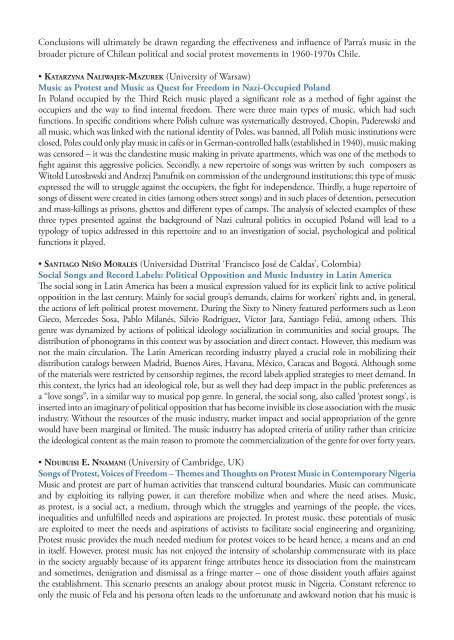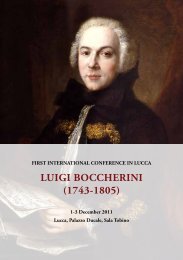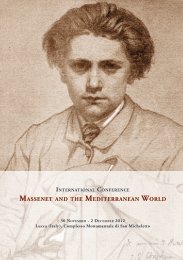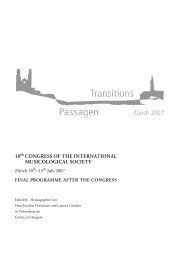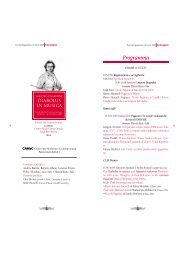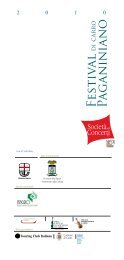PROGRAMME - Centro Studi Opera Omnia Luigi Boccherini
PROGRAMME - Centro Studi Opera Omnia Luigi Boccherini
PROGRAMME - Centro Studi Opera Omnia Luigi Boccherini
You also want an ePaper? Increase the reach of your titles
YUMPU automatically turns print PDFs into web optimized ePapers that Google loves.
Conclusions will ultimately be drawn regarding the effectiveness and influence of Parra’s music in thebroader picture of Chilean political and social protest movements in 1960-1970s Chile.• Katarzyna Naliwajek-Mazurek (University of Warsaw)Music as Protest and Music as Quest for Freedom in Nazi-Occupied PolandIn Poland occupied by the Third Reich music played a significant role as a method of fight against theoccupiers and the way to find internal freedom. There were three main types of music, which had suchfunctions. In specific conditions where Polish culture was systematically destroyed, Chopin, Paderewski andall music, which was linked with the national identity of Poles, was banned, all Polish music institutions wereclosed, Poles could only play music in cafés or in German-controlled halls (established in 1940), music makingwas censored – it was the clandestine music making in private apartments, which was one of the methods tofight against this aggressive policies. Secondly, a new repertoire of songs was written by such composers asWitold Lutosławski and Andrzej Panufnik on commission of the underground institutions; this type of musicexpressed the will to struggle against the occupiers, the fight for independence. Thirdly, a huge repertoire ofsongs of dissent were created in cities (among others street songs) and in such places of detention, persecutionand mass-killings as prisons, ghettos and different types of camps. The analysis of selected examples of thesethree types presented against the background of Nazi cultural politics in occupied Poland will lead to atypology of topics addressed in this repertoire and to an investigation of social, psychological and politicalfunctions it played.• Santiago Niño Morales (Universidad Distrital ‘Francisco José de Caldas’, Colombia)Social Songs and Record Labels: Political Opposition and Music Industry in Latin AmericaThe social song in Latin America has been a musical expression valued for its explicit link to active politicalopposition in the last century. Mainly for social group’s demands, claims for workers’ rights and, in general,the actions of left political protest movement. During the Sixty to Ninety featured performers such as LeonGieco, Mercedes Sosa, Pablo Milanés, Silvio Rodríguez, Víctor Jara, Santiago Feliú, among others. Thisgenre was dynamized by actions of political ideology socialization in communities and social groups. Thedistribution of phonograms in this context was by association and direct contact. However, this medium wasnot the main circulation. The Latin American recording industry played a crucial role in mobilizing theirdistribution catalogs between Madrid, Buenos Aires, Havana, México, Caracas and Bogotá. Although someof the materials were restricted by censorship regimes, the record labels applied strategies to meet demand. Inthis context, the lyrics had an ideological role, but as well they had deep impact in the public preferences asa “love songs”, in a similar way to musical pop genre. In general, the social song, also called ‘protest songs’, isinserted into an imaginary of political opposition that has become invisible its close association with the musicindustry. Without the resources of the music industry, market impact and social appropriation of the genrewould have been marginal or limited. The music industry has adopted criteria of utility rather than criticizethe ideological content as the main reason to promote the commercialization of the genre for over forty years.• Ndubuisi E. Nnamani (University of Cambridge, UK)Songs of Protest, Voices of Freedom – Themes and Thoughts on Protest Music in Contemporary NigeriaMusic and protest are part of human activities that transcend cultural boundaries. Music can communicateand by exploiting its rallying power, it can therefore mobilize when and where the need arises. Music,as protest, is a social act, a medium, through which the struggles and yearnings of the people, the vices,inequalities and unfulfilled needs and aspirations are projected. In protest music, these potentials of musicare exploited to meet the needs and aspirations of activists to facilitate social engineering and organizing.Protest music provides the much needed medium for protest voices to be heard hence, a means and an endin itself. However, protest music has not enjoyed the intensity of scholarship commensurate with its placein the society arguably because of its apparent fringe attributes hence its dissociation from the mainstreamand sometimes, denigration and dismissal as a fringe matter – one of those dissident youth affairs againstthe establishment. This scenario presents an analogy about protest music in Nigeria. Constant reference toonly the music of Fela and his persona often leads to the unfortunate and awkward notion that his music is


